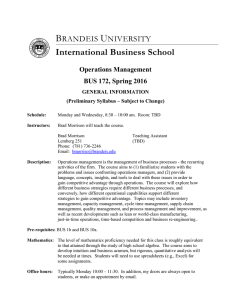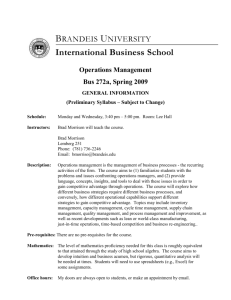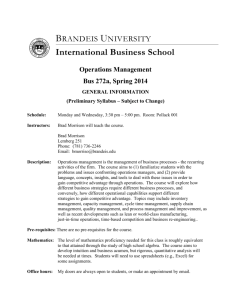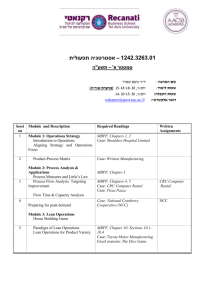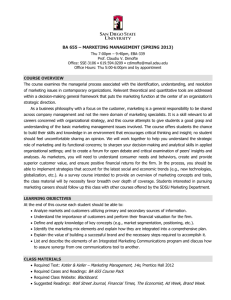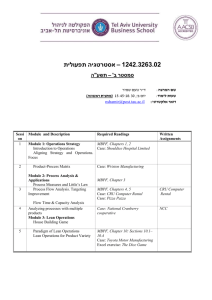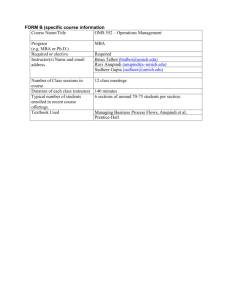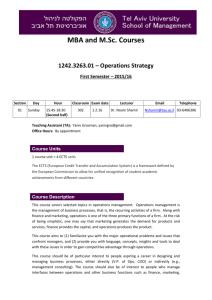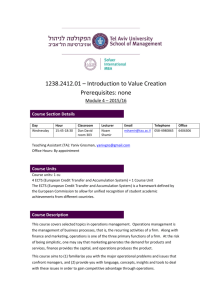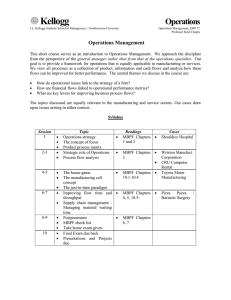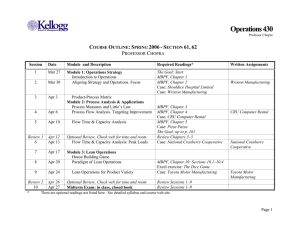Syllabus - Brandeis University
advertisement
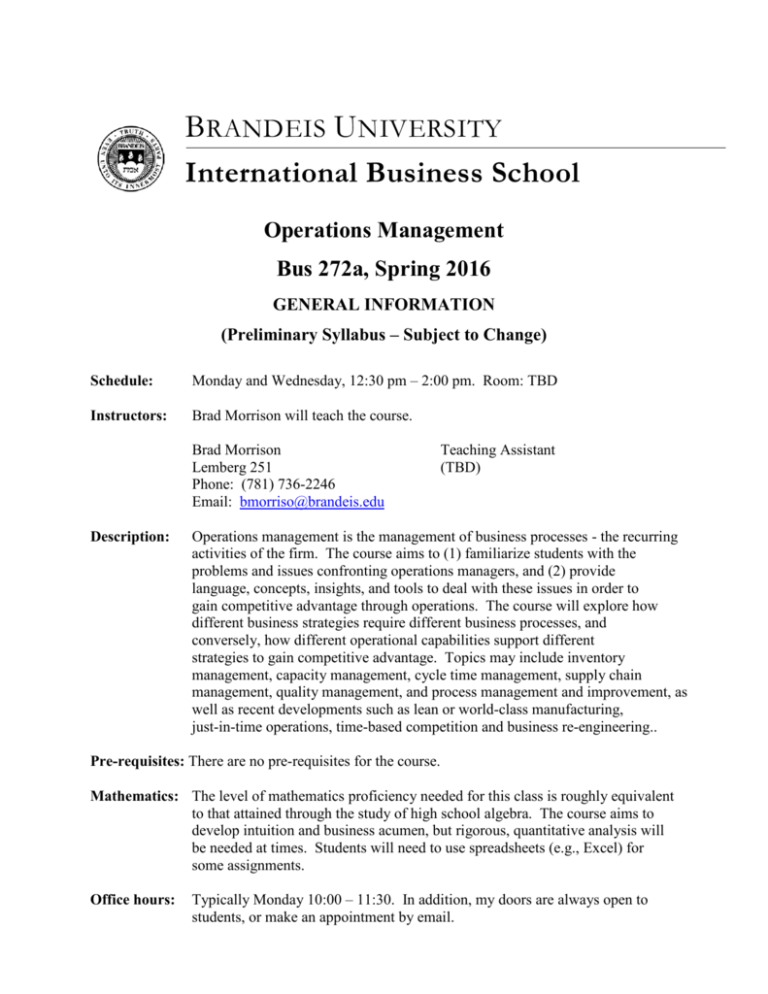
BRANDEIS UNIVERSITY International Business School Operations Management Bus 272a, Spring 2016 GENERAL INFORMATION (Preliminary Syllabus – Subject to Change) Schedule: Monday and Wednesday, 12:30 pm – 2:00 pm. Room: TBD Instructors: Brad Morrison will teach the course. Brad Morrison Lemberg 251 Phone: (781) 736-2246 Email: bmorriso@brandeis.edu Description: Teaching Assistant (TBD) Operations management is the management of business processes - the recurring activities of the firm. The course aims to (1) familiarize students with the problems and issues confronting operations managers, and (2) provide language, concepts, insights, and tools to deal with these issues in order to gain competitive advantage through operations. The course will explore how different business strategies require different business processes, and conversely, how different operational capabilities support different strategies to gain competitive advantage. Topics may include inventory management, capacity management, cycle time management, supply chain management, quality management, and process management and improvement, as well as recent developments such as lean or world-class manufacturing, just-in-time operations, time-based competition and business re-engineering.. Pre-requisites: There are no pre-requisites for the course. Mathematics: The level of mathematics proficiency needed for this class is roughly equivalent to that attained through the study of high school algebra. The course aims to develop intuition and business acumen, but rigorous, quantitative analysis will be needed at times. Students will need to use spreadsheets (e.g., Excel) for some assignments. Office hours: Typically Monday 10:00 – 11:30. In addition, my doors are always open to students, or make an appointment by email. 2 Grading Emphasis: Class participation: Case Write-ups, Assignments: OM Simulation: Mid-term Examination: Process Improvement Project and Vignette: 15% 25% 15% 30% 15% Policy on Missed Classes If you need to miss a class for some reason, I will understand. Such things happen. Please try to let me know in advance that you will miss the class and why. One absence will be excused and will not affect your grade. More than one absence will cause your class participation grade to be reduced by one-half grade for each absence, e.g., A becomes A-/B+; B becomes B/B-. Excessive absences may lead to failing the class. Special Accommodation If you are a student with a documented disability on record at Brandeis University and wish to have a reasonable accommodation made for you in this class, please see me immediately. Academic Integrity Academic honesty: You are expected to be honest in all of your academic work. Please consult Brandeis University Rights and Responsibilities for all policies and procedures related to academic integrity. Students may be required to submit work to TurnItIn.com software to verify originality. Allegations of alleged academic dishonesty will be forwarded to the Director of Academic Integrity. Sanctions for academic dishonesty can include failing grades and/or suspension from the university. Citation and research assistance can be found at LTS - Library guides. The use of case solution and homework solutions from previous students or found on the internet is strictly forbidden and will be considered an automatic violation of the academic integrity standards. Such use of existing material is an act of cheating and plagiarism. Students are expected to be on time for class, prepared to participate. Please put laptops and cell phones away, unless otherwise instructed. Use of a cell phone during class will cause your attendance record to reflect an absence for that class meeting. Professionalism in class elevates the quality of the experience for all. Course Requirements The course integrates three parallel streams of learning activity: case preparation and classroom discussion, readings including the core textbook, and homework assignments. Much of what should be learned in this class takes place outside the classroom, in homework assignments and through group discussion. Students are required to hand in their written assignments in groups and are encouraged to use these groups to discuss case preparation. Each group should have three members and must plan to stay together for the entire semester. 3 Assignments The course aims to engage you in the issues, to teach you ways to think about and analyze operational problems, and to prepare you to be effective managers. The course assignments are designed in support of these objectives. The readings and assignments will generally require an average of about three hours of preparation per class meeting. If you find yourself averaging more than three hours of preparation per session, please let us know. Some case preparations may take more than three hours. This will, however, be made up by some other classes that ask for less preparation. Class Discussion A typical class session starts with the instructor asking one or more students to begin the discussion by addressing specific questions. You should have no difficulty in handling such a lead-off request if you have thoroughly prepared the case or reading. After a few minutes of initial analysis and recommendations, the discussion will be opened to the rest of the class. As a group, we will try to build a meaningful analysis of the situation and address the problems and issues it presents. We will also talk about the implementation of recommendations we develop. Criteria that might be used for judging effective class participation are: 1. Relevance, 2. Insightfulness (in analysis, observation, or questions), 3. Constructiveness in the context of the class discussion flow, 4. Depth of analysis, 5. Clarity and brevity. In-class contribution will consist mainly of voluntary contributions, although I may call upon students, usually to answer opening questions. (Although cold calling may increase anxiety, “supportive” cold calling encourages you to be better prepared for class and as a result improves the overall class discussion.) A thorough preparation of the assigned materials is all that is necessary for such leadoff questions. If you feel uncomfortable with being called on in class please let me know in advance. Case Write-Ups Case analysis and write-ups, done in groups, may be required for designated cases. Each case write-up should address key questions in the case, which will sometimes be provided by the instructor. In preparing your presentation, please adhere to the following guidelines: ⇒ Be concise and well-structured: Recommendations should be summarized on one page (you may add exhibits). ⇒ Be to the point: Know that you write to someone who knows the facts of the case; focus on your explanation, and making a clear case for, your recommendations. ⇒ Be punctual: Late submissions will be penalized. More information regarding case write-ups will be provided when the first case is assigned. 4 Texts and Readings Course Reading and Exercise Materials: 1. Managing Business Process Flows, 2nd Edition, by Anupindi, Chopra, Deshmukh, Van Mieghem and Zemel. Prentice Hall, 2006. 2. Chapter 6 Supplement: Linear Programming, from Stevenson, William J., Operations Management, 8th Edition, 2005. (This chapter will be available for purchase online directly from McGraw-Hill.) 3. The Goal by Goldratt and Cox. Publisher: North River Press, 2nd edition, 1992. 4. Littlefield Simulation, a web-based simulation exercise. Students will be required to purchase a license from Responsive Learning Technologies to use the simulator for a class exercise and assignment. Purchase information for access codes will be provided in class. 5. A supplemental reading to support the Process Improvement Module. Details will be provided in class. 6. Transportation charges for our plant tour(s). Students may be required to pay a fee for transportation for our plant tours. The Goal is written as a novel, making for light reading, and some sections are quite entertaining. Nevertheless, it is 337 pages long, so you are encouraged to start reading now. We will draw on the book throughout the entire course. CRU Computer Rental (Kellogg Case): This case can be downloaded from http://www.prenhall.com/anupindi. Go to the web site, click begin, go to student resources, find the case and download it. BP and the Deepwater Horizon Disaster of 2010 (MIT Sloan Case): Cal’s Calzones (Brandeis IBS Case): These cases can be downloaded from the course Latte website. Several cases available from HBS Publishing will be required. Students may purchase these cases from the HBSP site for this course. Further instructions for downloading will be available when these cases are needed. Additional readings will be handed out on an occasional basis. 5 Suggested Readings These readings are not required, but you may find them interesting. The books are non-technical in nature. 1. The Machine that Changed the World: The Story of Lean Production by James P. Womack, Daniel T. Jones and Daniel Roos, Harper Perennial, 1991. 2. Clockspeed, by Charles H. Fine, Perseus Books, 1998. 3. Plant and Service Tours in Operations Management by Roger W. Schmenner, Fourth edition, Macmillan Publishing Company, 1994. 6 OPERATIONS MANAGEMENT Bus 272a S16 DRAFT SYLLABUS DETAILS OF THE SYLLABUS WILL CHANGE. THIS VERSION IS AN OUTLINE OF TOPICS WE WILL COVER. Date Due Class 1/13 W 1 1/20 W 2 1/25 M 2a 1/27 W 2b 2/1 M 3 2/1 2/3 2/8 M W M * 2/10 W * Module and Description Introduction Operations Management: What and why? Operations Management in Action In-Class Exercise Process Map Coaching Session (optional) Process Map Coaching Session (optional) Strategy and process spectrum 6 Assignment 1 Due Strategy and process spectrum Process Analysis & Applications Process measures & Little’s law Process flow analysis Winter Break Flow time & capacity analysis 4 5 2/22 M 7 2/24 W 8 2/29 M 9 2/29 3/2 M W 3/7 M 3/8 3/9 T W 3/14 M * 10 11 * 12 13 Inventory Management Inventory basics & economies of scale Introduction to the Economic Order Quantity Assignment II Due Dealing with uncertainty Safety stock and levers for improvement Optimal Service Levels The Newsvendor Model Assignment III Due Operations Management in Action (TBD) Mid-term Examination Required Readings Read: MBPF: Chapters 1, if possible Read: MBPF: Chapters 1 and 2 Case: Shouldice Hospital Limited Case: Wriston Manufacturing Read: MBPF: Chapter 3 Read: MBPF: Chapter 4 Case: CRU Computer Rental Read: MBPF: Chapter 5 Read: The Goal (up to p 161) Case: Cal’s Calzones Read: MBPF: Chapter 6 Read: MBPF: Chapter 6 Read: MBPF: Chapter 7 Read: MBPF: Chapter 7 Prepare: Assigned Questions 7 3/16 W 3/16 W 3/16 W 3/21 M 15 3/23 W 16 3/23 W 3/30 W 3/30 3/30 W W 4/1 F 18,19 4/4 4/6 4/6 M W W 20 4/11 M 21 4/13 W 22 4/13 4/15 4/18 W F M * * 23 24 4/20 W * 25 4/21 14 * 17 * * 5/2 M 5/2 M 26 * Applications: Process Improvement Process Evaluation and Re-design Tools of Process Mapping 9:00 am - Registration Deadline Littlefield Operations Management Exercise Littlefield Operations Management, Part 1 Begins, Start Time TBD International Supply Chains (tentative) Operations Management in Action In-Class Exercise – Managing Ops Littlefield Operations Management Exercise, Part 1 Ends Decision Analysis in Operations Formulating Linear Programs Littlefield Part 1 Write-up Due Littlefield Operations Management Exercise, Part 2 Begins (Tentative Date) Plant tour Details TBD Solving Linear Programs No Class – Littlefield Simulation time Littlefield Operations Management Exercise, Part 2 Ends Applications of Linear Programs (Flipped Class) Operations and Ethics Littlefield Part 2 Write-up Due TBD date: Plant tour Process Improvement Vignette Presentations Group Process Improvement Vignette Presentations Group II Assignment I Due Spring Break The Implementation Challenge Wrap-up and Review Plant tour write-up due Case: CVS Failure to register by the deadline will result in a grade of zero for the assignment. Case: IKEA’s Global Sourcing Challenge Reading: Stevenson Excerpt Reading: Stevenson Excerpt Case: BP and the Deepwater Horizon Disaster of 2010
